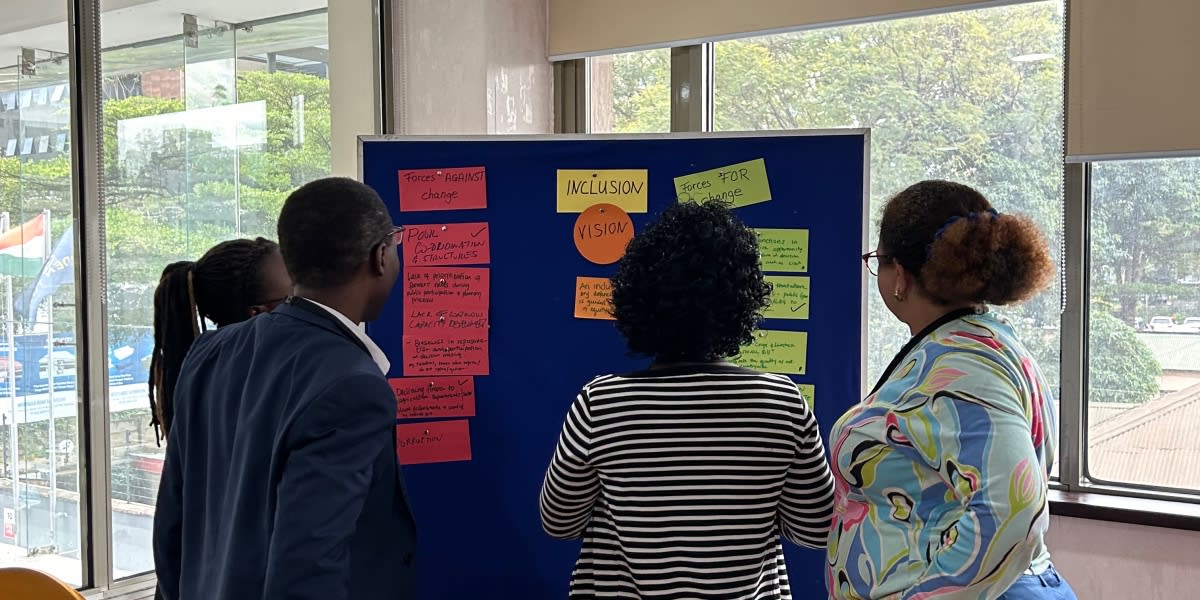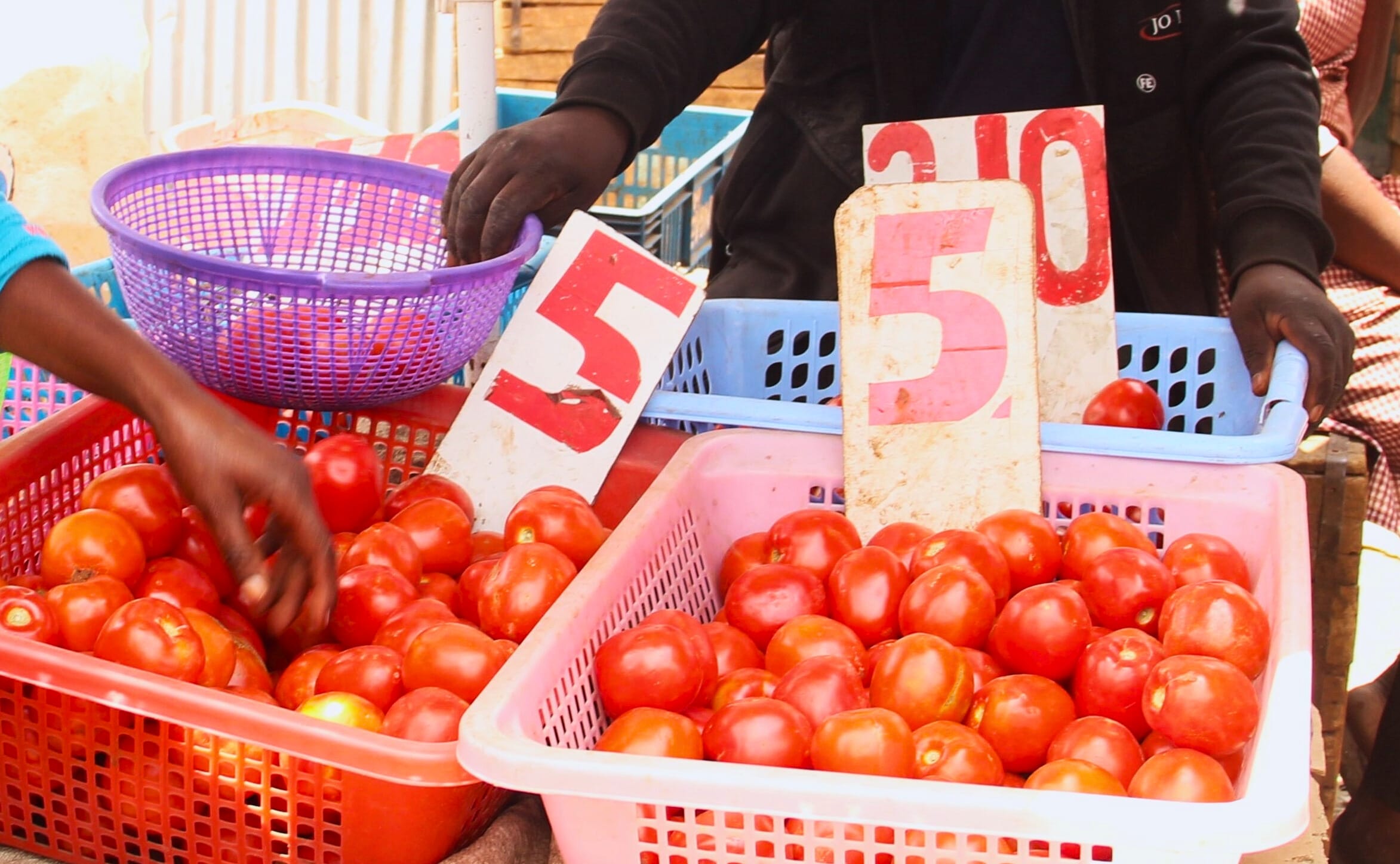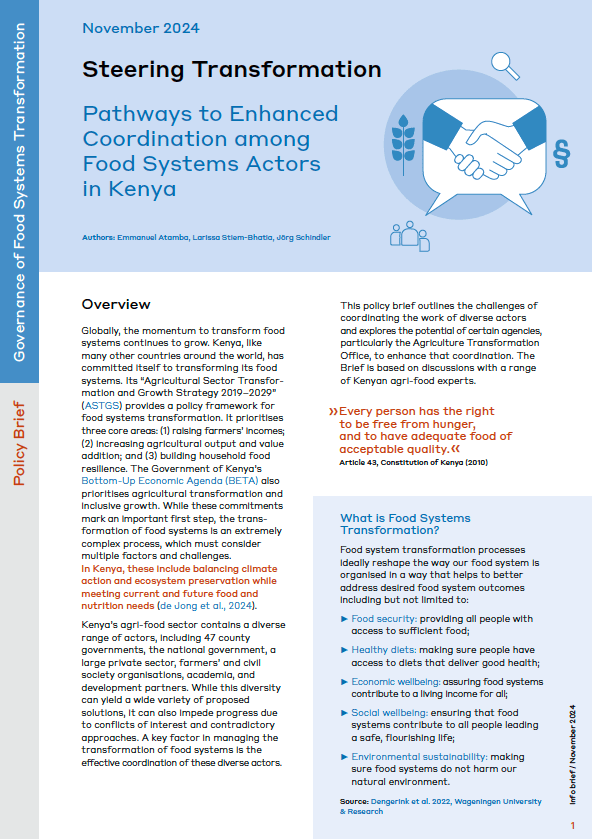Coordination: a game-changer in Kenya’s food systems transformation?
Drawing on dialogues with experts in Kenya, TMG Research releases its latest policy brief highlighting the critical need to strengthen coordination mechanisms in food systems governance.
by Emmanual Atamba, Larissa Stiem-Bhatia | 2024-11-22

“We have not invested enough in ensuring that the different efforts we put into transforming our food systems are adequately coordinated, and that might be our biggest undoing as a country and a sector,” said Agatha Thuo, Chief Executive Officer of the Agricultural Sector Network.
Agatha recently participated in our expert interview which informed our latest policy brief centering on how Kenya enhance the agrifood sector by strengthening coordination mechanisms. Her words reflect a critical reality: while Kenya has taken commendable steps toward food systems transformation, the success of these efforts hinges on addressing a fundamental challenge—effective coordination.
In recent years, the global call to transform food systems has gained significant traction, and Kenya is no exception. With its Agricultural Sector Transformation and Growth Strategy 2019–2029 (ASTGS), the Kenyan government has laid out a roadmap to achieve sustainable and inclusive agricultural transformation. Kenya has set out to achieve nothing less but eradicating hunger, raising farmers’ incomes, and preserving the natural base for food production (among many other action areas). However, turning these commitments into action is no small feat.
A food systems approach inherently adds complexity, requiring multi-sectoral collaboration across agriculture, environment, forestry, nutrition, health, and industry. This complexity involves diverse stakeholders with often conflicting priorities and perspectives. A new policy brief by TMG Research sheds light on how Kenya can overcome challenges in its agrifood sector by strengthening coordination mechanisms—most notably through revamping the Agriculture Transformation Office (ATO). The brief is based on discussions with a range of Kenyan agrifood experts.
The coordination gap
Transforming food systems isn’t just about implementing scientific solutions—it’s also a sociopolitical challenge. In Kenya, stakeholders, including 47 county governments, the national government, private companies, civil society organizations, academia, and development partners, must align their efforts to achieve a common vision.
While the ASTGS outlines clear goals, the strategies to achieve these goals often diverge. For example, debates center on whether to prioritize smallholder farming practices or invest in large-scale, export-oriented agriculture. Such competing ideologies underline the need for a strong coordinating body to mediate these tensions and drive coherent, inclusive policies.
However, Kenya's existing coordination mechanisms face critical challenges, including sporadic engagement between government and non-state actors, underfunded and inconsistently implemented county-level structures, and capacity constraints in key government institutions. These gaps hinder sustained collaboration, limit representation of marginalized voices, and impede effective governance.
A Path Forward: Strengthening coordination mechanisms
The policy brief reviews the food systems coordination landscape, existing mechanisms, and governance structures for coordination, offering specific recommendations to strengthen these frameworks. A key focus lies on enhancing the ATO as a national, overarching coordination mechanism. By strengthening the ATO, Kenya can leverage its existing structure to drive meaningful change. Experts agree that revamping the ATO offers continuity, cost-efficiency, and faster implementation compared to creating new institutions.
To strengthen the ATO, the policy brief recommends:
clarifying its mandate to encompass broader food systems governance,
enhancing transparency to build trust,
fostering multi-stakeholder engagement through regular dialogues,
increasing capacity and securing sustainable funding,
and improving county-level coordination.
As we explore a multi-stakeholder approach for strengthening the ATO structure and its engagement with other stakeholders, interviewee Nancy Rapando of WWF Kenya further emphasized,
“We need to work on trust. If actors do not trust each other, there is no way they can be on the same table.”
The full policy brief can be found here
This blog article was written by Emmanuel Atamba and Larissa Stiem-Bhatia, TMG Research gGmbH
Disclaimer: The policy brief is part of the “Governance of Food Systems Transformation” project, implemented by TMG and financed by the German Federal Ministry for Economic Cooperation and Development (BMZ)
 Land GovernanceDec 18, 2025
Land GovernanceDec 18, 2025Land tenure, women’s land rights, and resilience: Reflections from CRIC23 toward UNCCD COP17
Our experts discuss what the exchanges at CRIC23 highlighted and revealed about the role of secure and gender-equitable land tenure in the UNCCD's work ahead of the 2026 triple COP year.
Frederike Klümper, Washe Kazungu
 Urban Food FuturesDec 09, 2025
Urban Food FuturesDec 09, 2025The story of Mukuru's Urban Nutrition Hub
In Mukuru informal settlement, a safe haven for women has grown into the Urban Nutrition Hub, a multi-purpose space for nutrition education, training, and community development, demonstrating the potential of grassroots community-owned innovation..
Serah Kiragu-Wissler
 Urban Food FuturesSep 29, 2025
Urban Food FuturesSep 29, 2025Cheaper food, higher costs: The paradox of Nairobi’s food systems
What are the hidden costs of foods sold in Nairobi's informal markets, and who must bear them? We discuss how the city could build food systems that are both affordable and fair—for consumers and the people who feed them.
Christian Sonntag, Emmanuel Atamba, Lumi Youm


